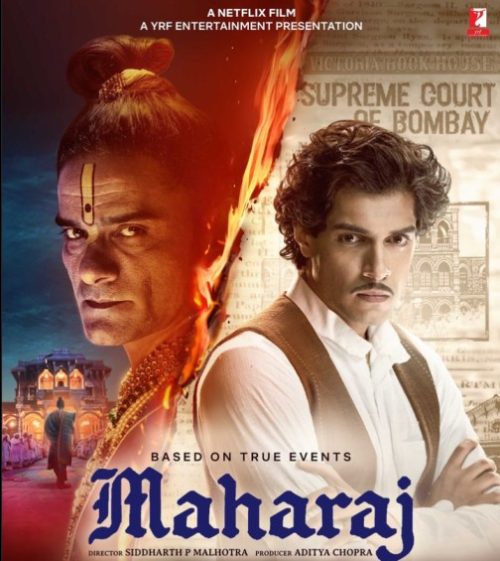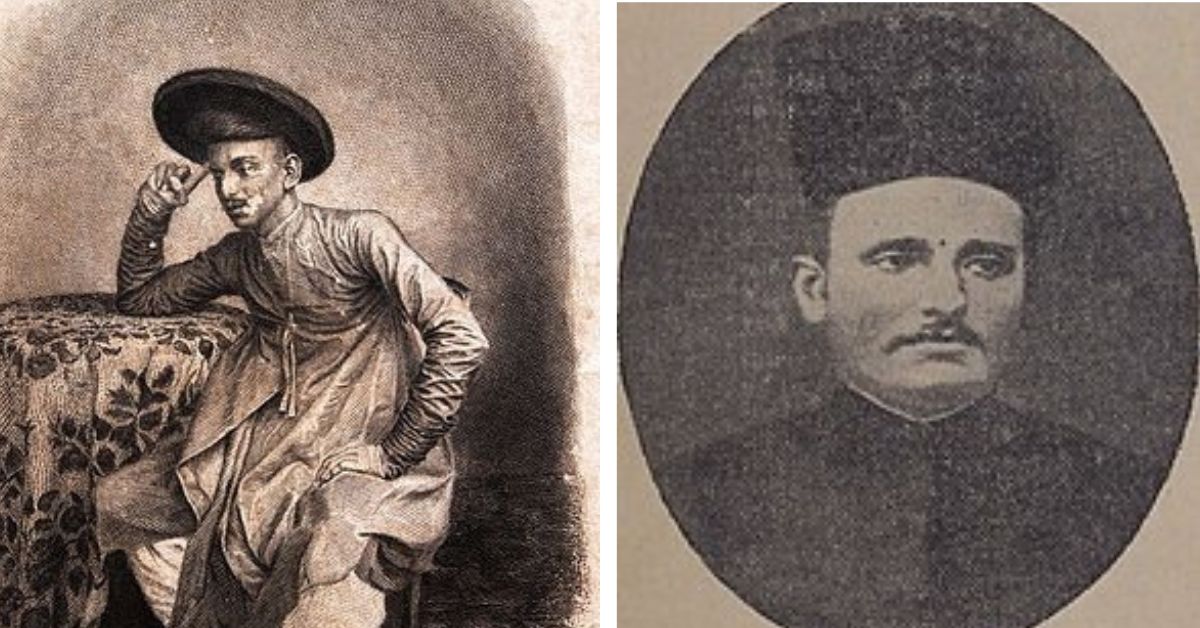A high-tension courtroom filled to the brim with onlookers keenly observing every move of the judges. The key players are a journalist and a renowned godman facing allegations of sexual assault. Sounds like a thriller, right? What if we told you this actually happened in the 1800s?
Filmmaker Siddharth P Malhotra’s upcoming called ‘Maharaj’ — Starring Junaid Khan, Jaideep Ahlawat, Sharvari Wagh, and Shalini Pandey — is based on a similar incident.
Centred on the Maharaj Libel Case of 1862 in the Bombay High Court, the film highlights the efforts of real-life journalist Karsandas Mulji to expose the alleged sexual misconduct of religious leader Jadunathji Brijratanji Maharaj.
Judge Joseph Arnould ruled in favour of Karsandas, making it sensational news at the time. In the words of Arnould, “A public journalist is a public teacher: the true function of the press, that by virtue of which it has rightly grown to be one of the great powers of the modern world—is the function of teaching, elevating and enlightening those who fall within the range of its influence.”
So who was this brave journalist, and why did he involve against the ‘Maharaj’ — here is a bite of history.
Born in Mumbai in 1832 to a family of the Kapol Caste, a trading caste of Western India, Karsandas was always dedicated to public service. He was an active member of the Gujarati Gnanprasarak Mandalli (Gujarati Society for the Spread of Knowledge), founded by the Students’ Society of Elphinstone College. Among his classmates were prominent reformers such as poet Narmad and educationist Mahipatram Neelkanth.
According to an article by The Print, “In 1851, he penned an essay for a literary competition, advocating for widow remarriage. When the news reached Karsandas’ elderly aunt, who had cared for him following his mother’s death, she promptly evicted him from her home. At the time, Karsandas was married.”
However, neither society nor familial pressure could stop Karsandas from following his journalistic instincts. Wanting to be more free with his writing and ideas, he decided to start his own magazine.
With the help of some friends, in around 1855 called Satyaprakash to further his work of social interest. The weekly magazine was known for boldly confronting outdated Indian traditions and societal evils.

Netflix Film Maharaj
According to a report by Indianliberals.in, “The paper had a meagre subscription of 500, yet its impact on Bombay’s conservative Gujarati Hindu community can’t be overstated. In the 1850s, he went on to edit a series of newspapers.”
Karsandas was a follower of the Pushtimarg sect, founded by Vallabhacharya in the 16th century, a prominent Hindu devotional sect in western India. By the 19th century, Pushtimarg had amassed significant wealth and influence, with its spiritual leaders, known as Maharajs, wielding considerable power over their followers. These leaders were revered as living incarnations of Krishna and enjoyed a lavish lifestyle supported by the donations of devotees.
However, the Maharajas often faced allegations of sexual impropriety and corruption, leading to a growing rift between traditionalists and reform-minded individuals by the late 1800s.
He himself also started to question the viability of the faith through his writings. In 1861, he published an article titled Hinduono Asal Dharma ane Haalna Pakhandi Mato (The Primitive Religion of the Hindus and the Present Heterodox Opinions), which delivered the heaviest blow on the Maharaj.
Among other charges, it accused them of having sexual alliances with their female devotees. The Print report states, “It led to the Maharaj filing the famous libel case in the Bombay court; it was called the “greatest trial of modern times since the .”
A paper posted by The University of Toronto said, “The article in question not only denounced the Pushtimarg as heterodox, a latter-day corruption of the original Vedic religion; it also specifically accused Jadunathji of imposing himself sexually on his female devotees.”
Jadunathji Brijratanji Maharaj filed a lawsuit worth Rs 50,000 against Karsandas for harming his reputation.
Maharaj might have hoped that the would clear his “good name”, but he was sorely mistaken.
The trial of the case in the Supreme Court was held before a full court, presided over by Chief Justice Mathew Sausse and Joseph Arnould. The case attracted significant interest from the press, and thousands of members of the public attended the court proceedings.

Karsandas Mulji
Karsandas who belonged to the same community faced a lot of pressure and was threatened to be excommunicated. “Thirty-one witnesses for the plaintiff and thirty-three witnesses for the defendants were examined; Jadunath Maharaj was brought to court, which ultimately dismissed his defamation charges,” said The Print report.
During the trial, the sect’s philosophies were examined and compared with other Hindu texts by missionary orientalist scholars and philosophers like John Wilson. Doctors, including Bhau Daji who was a known Indian physician, Sanskrit scholar and an antiquarian, testified that they had treated the religious leader for syphilis, and several witnesses recounted his erotic escapades.
The trial featured dramatic testimonies from various witnesses, including women who claimed to have been exploited by the Maharaj. These testimonies were crucial in substantiating Karsandas’ allegations and painted a stark picture of the abuses of power within the sect.
The case came to a close on 22 April, 1862, with a judgment in favour of Karsandas Mulji. The court awarded him Rs 11,500, as he had to bear a total expenditure of Rs 14,000 during the trial.
Closing the case Judge Arnould stated: “It is not a question of theology that has been before us! It is a question of morality. The principle for which the defendant and his witnesses have been contending is simply this: That what is morally wrong cannot be theologically right.”
Karsandas passed away in 1871 and is remembered fondly as the social reformer-journalist for his journalistic work.
(Edited by Padmashree Pande & Pranita Bhat)
Filmmaker Siddharth P Malhotra’s upcoming called ‘Maharaj’ — Starring Junaid Khan, Jaideep Ahlawat, Sharvari Wagh, and Shalini Pandey — is based on a similar incident.
Centred on the Maharaj Libel Case of 1862 in the Bombay High Court, the film highlights the efforts of real-life journalist Karsandas Mulji to expose the alleged sexual misconduct of religious leader Jadunathji Brijratanji Maharaj.
Judge Joseph Arnould ruled in favour of Karsandas, making it sensational news at the time. In the words of Arnould, “A public journalist is a public teacher: the true function of the press, that by virtue of which it has rightly grown to be one of the great powers of the modern world—is the function of teaching, elevating and enlightening those who fall within the range of its influence.”
So who was this brave journalist, and why did he involve against the ‘Maharaj’ — here is a bite of history.
A public servant
Born in Mumbai in 1832 to a family of the Kapol Caste, a trading caste of Western India, Karsandas was always dedicated to public service. He was an active member of the Gujarati Gnanprasarak Mandalli (Gujarati Society for the Spread of Knowledge), founded by the Students’ Society of Elphinstone College. Among his classmates were prominent reformers such as poet Narmad and educationist Mahipatram Neelkanth.
According to an article by The Print, “In 1851, he penned an essay for a literary competition, advocating for widow remarriage. When the news reached Karsandas’ elderly aunt, who had cared for him following his mother’s death, she promptly evicted him from her home. At the time, Karsandas was married.”
However, neither society nor familial pressure could stop Karsandas from following his journalistic instincts. Wanting to be more free with his writing and ideas, he decided to start his own magazine.
With the help of some friends, in around 1855 called Satyaprakash to further his work of social interest. The weekly magazine was known for boldly confronting outdated Indian traditions and societal evils.

Netflix Film Maharaj
According to a report by Indianliberals.in, “The paper had a meagre subscription of 500, yet its impact on Bombay’s conservative Gujarati Hindu community can’t be overstated. In the 1850s, he went on to edit a series of newspapers.”
The Pushtimarg sect and Maharaj’s role
Karsandas was a follower of the Pushtimarg sect, founded by Vallabhacharya in the 16th century, a prominent Hindu devotional sect in western India. By the 19th century, Pushtimarg had amassed significant wealth and influence, with its spiritual leaders, known as Maharajs, wielding considerable power over their followers. These leaders were revered as living incarnations of Krishna and enjoyed a lavish lifestyle supported by the donations of devotees.
However, the Maharajas often faced allegations of sexual impropriety and corruption, leading to a growing rift between traditionalists and reform-minded individuals by the late 1800s.
He himself also started to question the viability of the faith through his writings. In 1861, he published an article titled Hinduono Asal Dharma ane Haalna Pakhandi Mato (The Primitive Religion of the Hindus and the Present Heterodox Opinions), which delivered the heaviest blow on the Maharaj.
Among other charges, it accused them of having sexual alliances with their female devotees. The Print report states, “It led to the Maharaj filing the famous libel case in the Bombay court; it was called the “greatest trial of modern times since the .”
A paper posted by The University of Toronto said, “The article in question not only denounced the Pushtimarg as heterodox, a latter-day corruption of the original Vedic religion; it also specifically accused Jadunathji of imposing himself sexually on his female devotees.”
Jadunathji Brijratanji Maharaj filed a lawsuit worth Rs 50,000 against Karsandas for harming his reputation.
A historic ruling
Maharaj might have hoped that the would clear his “good name”, but he was sorely mistaken.
The trial of the case in the Supreme Court was held before a full court, presided over by Chief Justice Mathew Sausse and Joseph Arnould. The case attracted significant interest from the press, and thousands of members of the public attended the court proceedings.

Karsandas Mulji
Karsandas who belonged to the same community faced a lot of pressure and was threatened to be excommunicated. “Thirty-one witnesses for the plaintiff and thirty-three witnesses for the defendants were examined; Jadunath Maharaj was brought to court, which ultimately dismissed his defamation charges,” said The Print report.
During the trial, the sect’s philosophies were examined and compared with other Hindu texts by missionary orientalist scholars and philosophers like John Wilson. Doctors, including Bhau Daji who was a known Indian physician, Sanskrit scholar and an antiquarian, testified that they had treated the religious leader for syphilis, and several witnesses recounted his erotic escapades.
The trial featured dramatic testimonies from various witnesses, including women who claimed to have been exploited by the Maharaj. These testimonies were crucial in substantiating Karsandas’ allegations and painted a stark picture of the abuses of power within the sect.
The case came to a close on 22 April, 1862, with a judgment in favour of Karsandas Mulji. The court awarded him Rs 11,500, as he had to bear a total expenditure of Rs 14,000 during the trial.
Closing the case Judge Arnould stated: “It is not a question of theology that has been before us! It is a question of morality. The principle for which the defendant and his witnesses have been contending is simply this: That what is morally wrong cannot be theologically right.”
Karsandas passed away in 1871 and is remembered fondly as the social reformer-journalist for his journalistic work.
(Edited by Padmashree Pande & Pranita Bhat)
